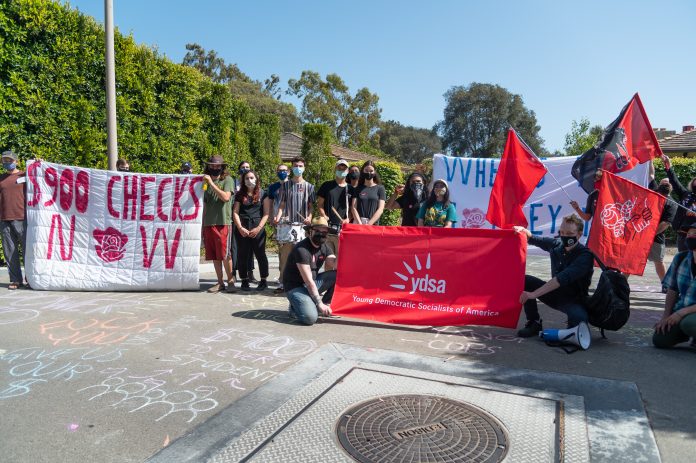Alexandra Wishakowsi
Isla Vista Beat Reporter
CORRECTION: When this article was originally published on our website on May 19, 2021, we mistakenly stated that Oprah Winfrey would be paid by the University to deliver a commencement speech for the class of 2021. Ms. Winfrey is not being paid for her speech and the article has since been updated to reflect that.
On Saturday, May 8, the UC Santa Barbara (UCSB) chapter of the Young Democratic Socialists of America (YDSA) held a “COVID Justice Campaign” on campus. The protest took place in a bid to pressure UCSB administrators to distribute millions of dollars left over from COVID-19 stimulus funding.
Originally, YDSA’s campaign started with a petition for all students to receive $400 based on $10 million of missing funds from the Coronavirus Aid, Relief, and Economic Security (CARES) Act, which was passed in late March 2020. UCSB received approximately $25 million and allocated only about half of this amount as financial aid grants.
Due to additional government COVID-19 relief funding passed in December of 2020 for colleges, YDSA is advocating for additional $500 stimulus payments from the Higher Education Emergency Relief Fund II (HEERF II) by the Coronavirus Response and Relief Supplemental Appropriations Act (CRRSAA).
In total, each eligible undergraduate student and graduate student at UCSB would receive a $900 financial aid grant from the CARES and CRRSAA funds.
Beginning their event around 2 p.m., YDSA and its supporters congregated at Storke Plaza with pizza and Yerba Mates provided for protesters.
Patrick Fairbanks, a fourth-year sociology major and the current secretary of UCSB YDSA, sat down for an interview with The Bottom Line before the event to explain why the organization is concerned with the fight for students’ livelihoods.
“We believe that the university should not be run like a business, but instead should be run like a public institution that is responsible [for] its students and faculty and staff to do what’s right by them,” said Fairbanks, in reference to the university’s refusal to lower tuition or reduce campus fees.
“Only about 56 percent of students got checks at all in the first two rounds, which left almost half of the entire student body out,” he continued.
UCSB’s Office of Financial Aid and Scholarships distributed both rounds of grants based on student FAFSA applications, with Pell Grant recipients receiving the largest amounts and non-Pell grant recipients with demonstrated financial need receiving smaller awards. The CARES Act legally requires a minimum of 50 percent of funds to be distributed as direct relief to students, while the CRRSAA Act requires institutions to prioritize students with exceptional financial need.
Transparency is another aspect of the campaign that YDSA is concerned about, as requests for meetings and conversations about what the university plans to do with the remaining $22 million have been ignored or dismissed by administrators. In response, YDSA sent a demand letter directly to Chancellor Henry T. Yang three months ago, which was unanimously endorsed by UCSB’s Associated Students (AS) and its president.
“Transparency is another aspect of the campaign that YDSA is concerned about, as requests for meetings and conversations about what the university plans to do with the remaining $22 million have been ignored or dismissed by administrators.”
Additionally, organizations such as Food Not Bombs Isla Vista, the graduate student organization COLA/Cops Off Campus, and UAW 2865 — the union representing Academic Student Employees across the University of California system — are currently supporting YDSA with its campaign.
At around 3 p.m., the protesters marched to Chancellor Yang’s on-campus home, where he lives free of cost while earning approximately $400,000 a year. Although the Chancellor was seemingly not inside and remained silent on the issue, YDSA opened the floor to speakers and students to air their grievances by chalking slogans on his driveway.
In one of the speeches, Fairbanks criticized the university’s choices to spend money on its business interests — including raising administrative pay — while its student body struggles to afford rent and pay full tuition during the COVID-19 pandemic.
Toward the end of the event, Cody Nunn, a third-year political science major serving as YDSA’s treasurer, shared that the latest official response to the COVID Justice Campaign occurred the night before the march: “The administration let us know that they will not be sending us money.”
“They said that they simply don’t have it, and that they need it to balance the books because they lost a lot of their revenue,” he continued.
While the organization strongly doubts the university is willing to meet its demands, YDSA’s goal is to advocate for the transparency and accountability students deserve from administrators. For its next steps, YDSA is focused on spreading awareness and persisting in its efforts to have a conversation with UCSB administration and Chancellor Yang.
“We want them to know that there are a lot of people who are willing to spend their days advocating for it and that it matters to that many people,” said Nunn.
UCSB students who wish to support the COVID Justice Campaign may join YDSA by becoming a member of the Young Democratic Socialists of America or follow UCSB YDSA’s social media for future events and announcements.











